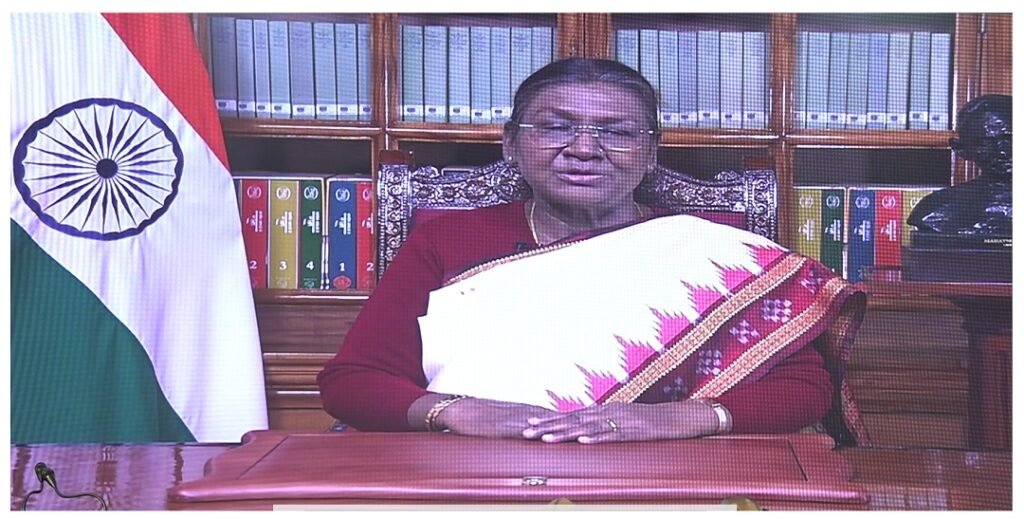Shillong, Jan 9: President of India Droupadi Murmu on Thursday cancelled her visit to the ICAR Research Complex for NEH Region Umiam, due to bad weather.
President Murmu was supposed to inaugurate the Golden Jubilee program and visit the Farmers Expo 2025.
Addressing the gathering through a recorded message, the President said that the ICAR Research Complex for NEH Region Umiam has developed hundreds of crop varieties suited to the region’s agro-climatic conditions over the years.
“It also has developed pig breeds, poultry, and turmeric varieties by introducing high-yielding and climate-resilient varieties of paddy maize and horticulture crops,” she said.
Murmu also said that the institute has enhanced food security and rural livelihood.
The President also said that she was told that the production of food grains and horticultural crops in the region has increased by 30 percent and 40 percent, respectively, in the last ten years.
She also said that the focus on agri-allied sectors like horticulture, livestock, and fisheries has been instrumental in generating livelihood and retaining the youth in agriculture.
Murmu said that the northeast has seen a 25 percent increase in agri-intravenous over the last five years with many youth venturing in floriculture, organic farming, and value addition of local produce.
The President also said that scientists should engage in the documentation of indigenous and traditional knowledge associated with the region’s unique crops, livestock, and biodiversity.
Murmu also said that the ICAR can help in pairing local knowledge with modern technological tools.
Speaking at the program, Union Agriculture Minister Shivraj Singh Chouhan emphasized the importance of collaboration between ICAR, state governments, and agricultural universities to develop strategies and solutions tailored to the needs of farmers.
He also proposed that these stakeholders work together and convene for consultations every three months to ensure a cohesive approach. The minister also expressed his commitment to being personally present at one of these meetings to gain a deeper understanding of the challenges and issues faced by farmers, allowing for more effective support and resolution.
Meghalaya Chief Minister Conrad K. Sangma said that logistical challenges have hindered the potential growth of the agriculture and allied sectors in the Northeast.
He urged the Centre to strengthen the logistics network in the region.
“The Northeast can become a hub for the country’s vegetable, organic farm products, mushroom, turmeric, ginger, and honey production, but due to logistical challenges, we have not been able to fully capitalize on the potential of our products,” Sangma said.
The Chief Minister informed that the region produces a diverse range of agricultural products, which can be exported to various cities. However, due to the lack of cold storage facilities and other infrastructure, these products are not being exported to their full potential. Despite these challenges, many products from Meghalaya have found a market in Europe and the UAE, particularly pineapples, oranges, ginger, and turmeric.
He also informed that the government has been working to strengthen the agricultural ecosystem by supporting farmers through various welfare programs and promoting agro-based entrepreneurship.
Lauding ICAR’s efforts in advancing agricultural research, Sangma congratulated ICAR on its golden jubilee and encouraged them to continue supporting farmers in the region.
He also emphasized the need for collaboration between ICAR and state machinery to develop research-based solutions for farmers to address diseases and other farm-related challenges. He categorically mentioned the bud rot disease affecting areca nut plantations, which has caused significant damage and posed a severe threat to livelihoods in various parts of the state.
The Chief Minister also stressed on the importance of inter-departmental collaboration to ensure climate resilience agricultural practices. He further sought support for large-scale bamboo production in the state, including the development of a cluster approach to promote other agricultural and horticultural products like ginger.
Sangma also urged the government to strengthen Krishi Vigyan Kendras (KVKs) at the grassroots level, empowering them to make decisions and drive growth in the agricultural sector.

